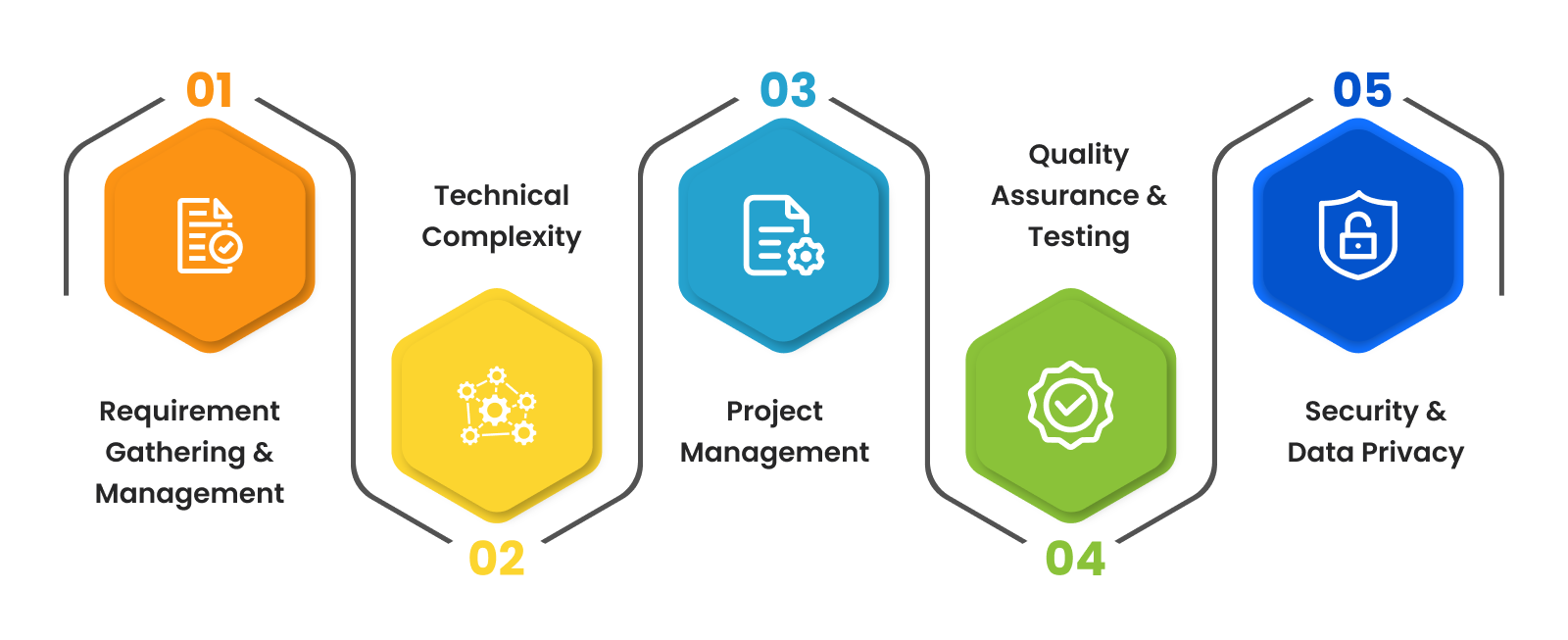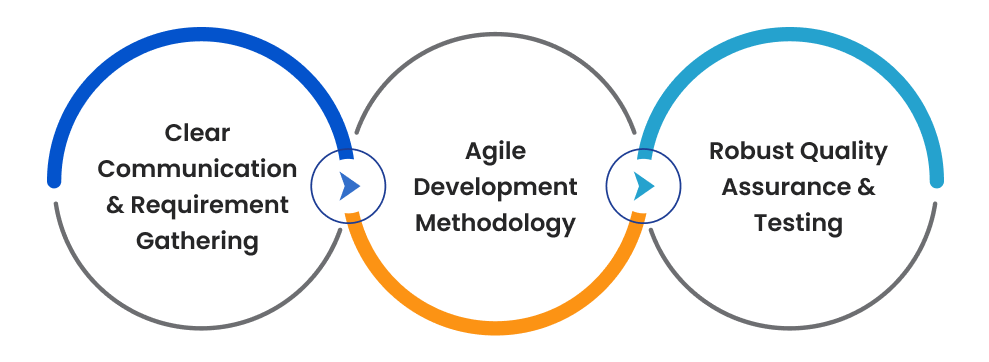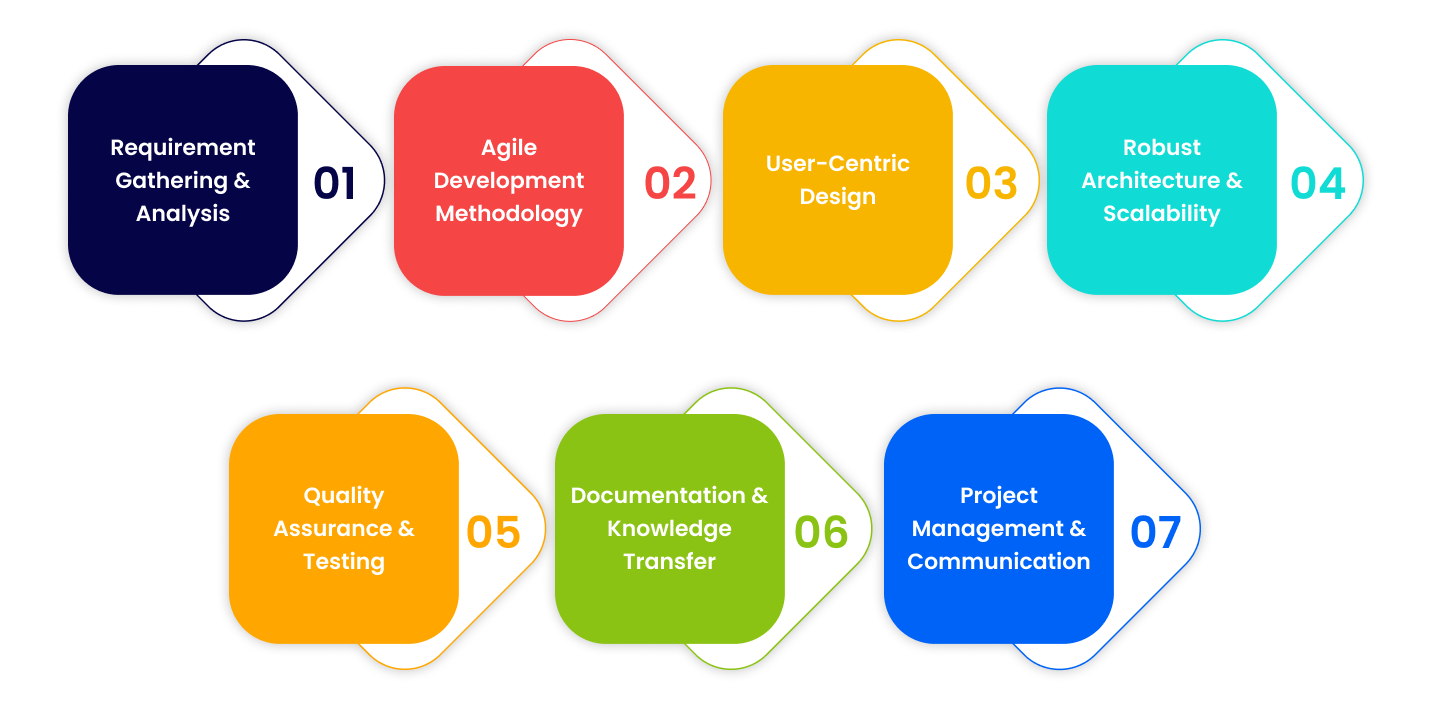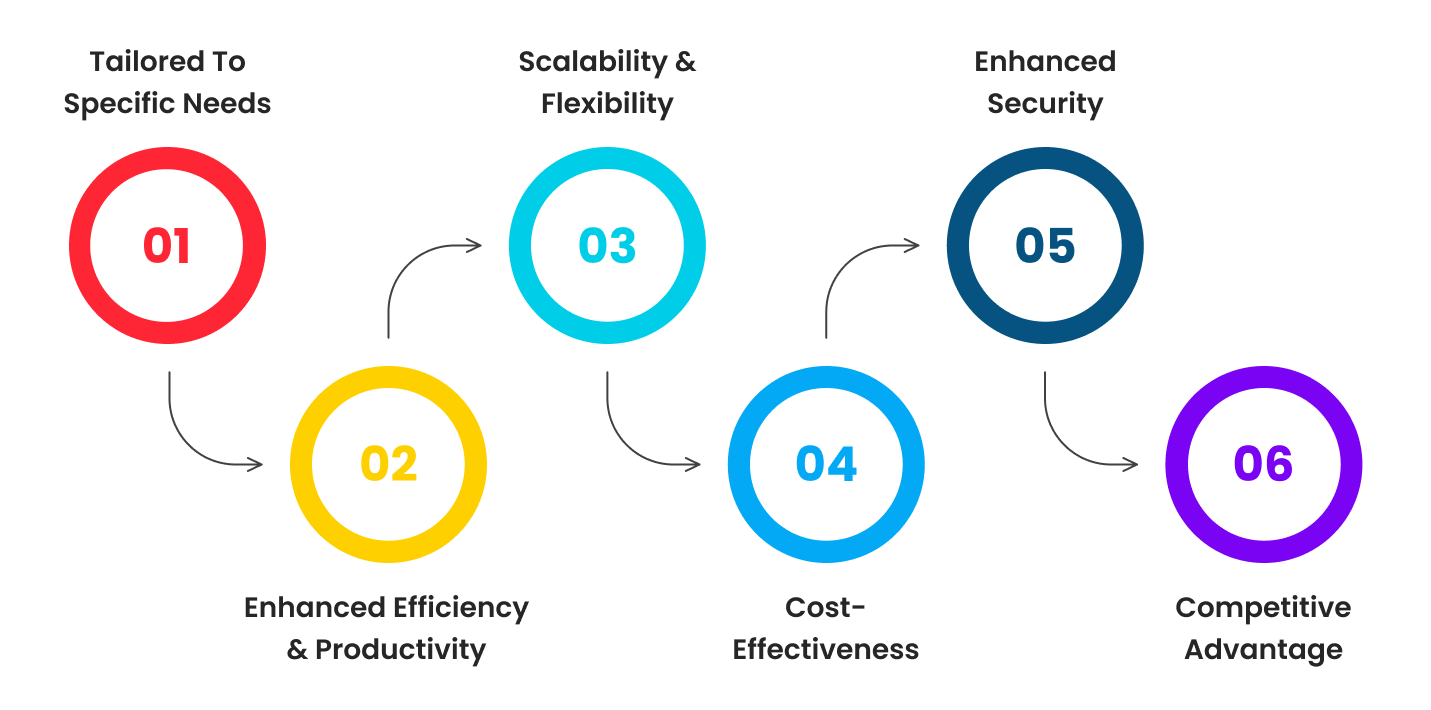- Mar 12, 2024
- Web Development
- 10331
Share this post on:

Custom software development involves designing, developing, and maintaining software applications that help businesses meet their needs. While it offers numerous benefits, such as increased efficiency, improved productivity, and an enhanced customer experience, it also presents several challenges that organizations must overcome.
Challenges in Custom Software Development
Even though there are many benefits that custom software development offers, there are a lot of challenges that appear during the development cycle. Let us explore the common challenges related to custom software development.

Requirement Gathering and Management: One of the primary challenges in custom software development is accurately gathering and managing requirements. This process involves understanding the client's needs and documenting them. Miscommunication or an incomplete understanding of requirements can lead to significant issues during development, resulting in delays, rework, and dissatisfaction with the final product.
Hence, it is crucial to establish effective communication channels between the development team and stakeholders. Regular meetings, workshops, and documentation reviews can help everyone get a clear understanding of the project's objectives and requirements. Additionally, implementing techniques such as prototyping or wireframing can provide visual representations of the software early in the development cycle, allowing for early feedback and validation of requirements.
Technical Complexity: Custom software development often involves dealing with complex technical requirements. Developing robust and scalable solutions requires expertise in various programming languages, frameworks, databases, and integration technologies. The complexity increases when integrating with existing systems or third-party APIs.
Organizations need to have a skilled development team with expertise in relevant technologies. Conducting thorough research and analysis before starting a project can help identify potential technical hurdles and plan appropriate solutions.
Project Management: Managing resources, timelines, budgets, and stakeholder expectations can be challenging due to the dynamic nature of software projects. However, businesses should adopt proven project management methodologies such as Agile or Scrum to overcome such challenges. These methodologies emphasize iterative development, frequent communication, and adaptability to changing requirements.
Quality Assurance and Testing: Ensuring the quality of custom software is another significant challenge. Organizations should implement a comprehensive testing strategy that includes unit testing, integration testing, system testing, and user acceptance testing. Automated testing tools can help streamline the testing process and improve efficiency. Additionally, involving quality assurance experts from the early stages of development can help identify potential issues before they become more challenging to fix.
Security and Data Privacy: Custom software often deals with sensitive data, making security, and data privacy critical concerns. Hence, organizations should follow secure coding practices, conduct regular security audits, and perform vulnerability assessments. Implementing encryption techniques, access controls, and secure authentication mechanisms can help safeguard sensitive data.
Overcome Challenges in Custom Software Development With Effective Strategies
Custom software development is a complex process and has its challenges. From managing project scope to ensuring quality and meeting deadlines, developers often face numerous obstacles throughout the development lifecycle. Let us explore effective strategies to overcome these challenges and ensure successful custom software development projects.

Clear Communication and Requirement Gathering: One of the primary challenges in custom software development is ensuring clear communication between stakeholders, including clients, project managers, developers, and end-users. Hence, it is crucial to establish a robust communication framework from the beginning. This includes conducting thorough requirement-gathering sessions with clients to understand their needs and expectations. Documenting these requirements in a detailed manner helps in avoiding ambiguity and provides a clear roadmap for the development team.
Agile Development Methodology: Agile methodologies provide a flexible framework that allows iterative development and frequent feedback loops.
By adopting an agile approach such as Scrum or Kanban, development teams can break down complex projects into smaller manageable tasks called sprints or iterations. This enables them to deliver incremental value at regular intervals while continuously incorporating feedback from clients and end-users.
Robust Quality Assurance and Testing: Ensuring the quality of custom software is crucial for its success. However, testing custom software can be challenging due to its unique requirements and complexities. It is essential to implement a robust quality assurance (QA) and testing process throughout the development lifecycle. This includes conducting thorough unit testing, integration testing, system testing, and user acceptance testing (UAT). Automated testing tools and frameworks can significantly improve the efficiency and effectiveness of the testing process.
Custom software development presents various challenges that organizations must overcome to deliver successful solutions. These challenges include requirement gathering and management, technical complexity, project management, quality assurance, and testing, as well as security and data privacy concerns. Organizations can mitigate these challenges and achieve successful custom software development projects by leveraging appropriate methodologies and collaborating effectively.
Best Practices in Custom Software Development Explained
It is essential to follow best practices that deliver high-quality results. Let us explore some of the best practices in custom software development.

Requirement Gathering and Analysis: The first and most crucial step in custom software development is gathering and analyzing the requirements. It is essential to have clear and concise requirements documentation that outlines all the features, functionalities, and constraints of the software.
Agile Development Methodology: Agile development methodology has gained significant popularity in recent years due to its iterative and incremental approach. It emphasizes collaboration, flexibility, and adaptability throughout the development lifecycle. Agile methodologies such as Scrum or Kanban enable teams to break down complex projects into smaller manageable tasks called sprints. This allows for continuous feedback, regular communication with stakeholders, and early detection of any issues or changes required.
User-Centric Design: User experience (UX) plays a vital role in the success of any software application. Custom software should be designed with the end-users in mind to ensure usability, efficiency, and satisfaction. User-centric design involves conducting user research, creating personas, and developing user stories to understand user behaviors, preferences, and pain points. This information helps developers and designers to design intuitive interfaces, easy navigation, and seamless interactions. Regular usability testing throughout the development process allows for iterative improvements and ensures that the final product meets the users' expectations.
Robust Architecture and Scalability: Custom software applications should be built on a scalable architecture. The architecture should be modular, flexible, and well-documented to allow for easy maintenance, updates, and enhancements. It is crucial to choose the right technologies, frameworks, and tools that align with the project's requirements and long-term goals.
Quality Assurance and Testing: Quality assurance (QA) and testing are integral parts of custom software development. This includes various types of testing such as unit testing, integration testing, system testing, performance testing, security testing, and user acceptance testing. Automated testing tools can help in streamlining the testing process and ensuring consistent quality throughout the development lifecycle.
Continuous Integration and Development: Continuous integration (CI) and deployment (CD) practices enable frequent code integration, automated builds, and rapid deployment of software updates. By automating repetitive tasks such as code compilation, testing, and deployment, custom software development teams can save time and effort while maintaining a high level of quality.
Documentation and Knowledge Transfer: Thorough documentation is essential for custom software development projects to ensure knowledge transfer among team members and stakeholders. Documentation should include technical specifications, architectural diagrams, user manuals, API documentation, release notes, and other relevant information.
Project Management and Communication: Effective project management and communication are critical for the success of custom software development projects. Project managers should ensure that there is clear communication among team members, stakeholders, and clients. Regular meetings, progress reports, and status updates help in keeping everyone informed about the project's progress, challenges, and milestones.
Custom software development requires adherence to best practices to ensure successful outcomes. These practices include thorough requirement gathering and analysis, adopting agile development methodologies, focusing on user-centric design, and building robust and scalable architectures. By following these best practices, organizations can maximize the value of their custom software development projects.
Benefits of Custom Software Development
Custom software development helps developers create software applications or systems that are tailored to meet the unique needs and requirements of a particular organization or business. Here are a few benefits that can significantly impact an organization's efficiency, productivity, and overall success.

Tailored to Specific Needs: One of the primary advantages of custom software development is that it allows businesses to have a solution that perfectly aligns with their unique requirements. Custom software can be designed to precisely match the workflows, business rules, and objectives of the organization. This level of customization ensures that every aspect of the software is optimized for maximum efficiency and effectiveness.
Scalability and Flexibility: Custom software is built with scalability in mind, allowing businesses to adapt and grow without facing limitations imposed by pre-packaged solutions. As organizations evolve and expand, their software needs may change as well. Custom software can be designed to accommodate future growth and seamlessly integrate new features or modules as required.
Enhanced Security: Security is critical for any organization dealing with sensitive data. Custom software can significantly reduce the risk of data breaches and unauthorized access by incorporating advanced security protocols, encryption techniques, access controls, and regular security updates
Enhanced Efficiency and Productivity: Custom software can streamline and automate complex business processes, resulting in improved efficiency and productivity. Custom software enables employees to focus on more strategic and value-added activities by eliminating manual tasks, reducing human errors, and integrating various systems into a unified platform. Additionally, custom software can provide real-time insights and analytics, empowering decision-makers with accurate data for informed decision-making.
Cost-effectiveness: Custom software eliminates the need for multiple licenses or subscriptions associated with off-the-shelf software. Moreover, it reduces the reliance on IT support for compatibility issues or system updates. Custom software is designed to fit the organization's infrastructure seamlessly, minimizing downtime and maintenance costs.
Competitive Advantage: Custom software development offers a competitive advantage by enabling organizations to differentiate themselves from their competitors. Organizations can offer enhanced services, improved customer experiences, and faster response times by having a unique software solution that perfectly aligns with their business model and processes. This differentiation can help attract new customers, retain existing ones, and establish a strong market position.
Hence, custom software development offers numerous benefits that can have a profound impact on an organization's operations and success.
Conclusion:
Organizations can increase their chances of delivering successful custom software solutions that meet business needs while minimizing risks and maximizing efficiency by implementing the right strategies and considering the challenges. If you are looking for a custom software development company that help you enhance your business, OZVID Technologies is considered the best in the market. OZVID has experts from various fields who have helped numerous customers worldwide grow.











